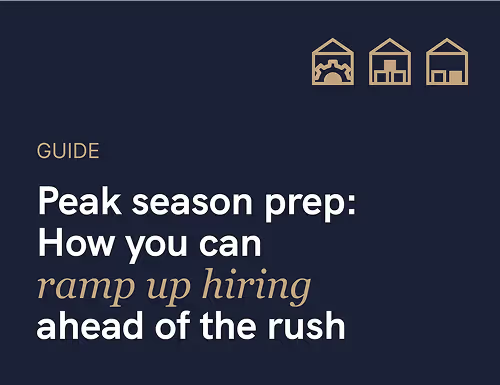Find Workers
⌄


The past few years have been challenging for light industrial businesses for several reasons, including labor shortages, fluctuations in demand, and rising costs. But with many of these conditions finally stabilizing, a substantial number of businesses report feeling more confident about attracting and retaining workers than they did the previous year.

While some businesses (34%) are still reporting forgone revenue due to fluctuating demand and staffing shortages, many are getting ready to ramp up their hiring for peak season and are using flexible labor to do so. For those in need of assistance, New York City Catering Temporary Staffing Services | Instawork can provide valuable support.
While there's more training required when bringing on flexible workers, businesses using best hiring practices can create a seamless onboarding system so flexible workers can hit the ground running. Here are some ways you can ramp up your hiring to build a strong workforce ready for peak.
To hire the right people for the job, you need to understand what exactly you're hiring for, who your ideal candidate is, and how to motivate them to work for you.
Collaborate with everyone involved in the hiring process to compile the skills needed to perform the job and write a job description that stands out. Highlight anything you offer that would motivate a candidate—career trajectory, perks, benefits, or overtime policies. And make sure you're clear about expectations. Reducing worker churn is essential so if the work is difficult, say so. The better you communicate expectations (and perks), the more successful your job candidate will be long-term. For more insights, check out 7 of the most common self-employment tax questions, answered.
Collaborate with everyone involved in the hiring process to compile the skills needed to perform the job and write a job description that stands out. Highlight anything you offer that would motivate a candidate—career trajectory, perks, benefits, or overtime policies. And make sure you're clear about expectations. Reducing worker churn is essential so if the work is difficult, say so. The better you communicate expectations (and perks), the more successful your job candidate will be long-term.
Furthermore, be deliberate in your hiring decisions. The more time you spend truly marketing to and vetting candidates, the more time you'll save on hiring overall because you will have hired the right people from the start.
To build a strong, sustainable team, you want to hire workers with the right skills for the job. But many warehouse skills can be taught, and prior experience shouldn't always be a breaking factor for a good candidate. Screen for experience, but don't forget to screen for other intangible aspects—work ethic, attitude, and willingness to learn are all part of the equation.
Platforms like Instawork provide visibility into worker profiles by showcasing work history as well as ratings from other employers, helping businesses understand a candidate's real potential before hiring them. We've all had our first day in a new role, so don't let past experience bias you against potential strong fits for your culture and environment.
Streamlining your processes to get staff up to speed as quickly as possible while not leaving them behind is key. Set your workers up for success by taking the time to organize and start your warehouse onboarding process in advance. Bring hiring managers and operations staff into the warehouse to evaluate the effectiveness of onboarding and listen to workers' needs.
Focusing on retention has always been the best way to keep your top performers—either permanent or flexible—happy long-term, especially through peak season. When surveyed, many businesses reported that popular tactics such as increased pay or flexible schedules help attract and keep their workers.

However, culture shouldn't go overlooked. The work environment you create goes a long way toward making sure workers have a positive experience at your facility. If the workers you bring in feel happy and supported during peak season, they may end up staying on as full-time employees into the next year, rather than leaving for another facility right down the road.
Many businesses prefer to use full-time in-house workers to staff all year round and there are obvious benefits from the stability of workers that you hand select, train, and retain. However, hiring only full-time workers doesn't allow for the type of flexibility that warehouses desperately need in order to navigate the inevitable volatility—late cancellations, demand spikes, and worker attrition—that comes with the busy fall season.
As a result, more businesses are using a "portfolio approach" to labor, balancing full- and part-time permanent employees with short- and long-term flexible labor. This approach offers several advantages, the foremost being the agility to respond to changes in demand. By mixing permanent and flexible labor, warehouses also have a strong base of permanent employees to supervise, train, and transmit institutional knowledge.
With all of these advances, it's no surprise that satisfaction with flexible workers in the light industrial industry is on the rise, increasing from 57% to 69% in 2022. Businesses are finding that access to "just in time" labor not only prepares them for volatility but supports them throughout an entire peak season.
When preparing for peak season, you can turn to platforms like Instawork flexible staffing solution for warehousing to help you build a bench of workers familiar with your expectations, work, and environment. Our network of qualified professionals is here to help you reach peak productivity as you navigate the busiest season of the year.